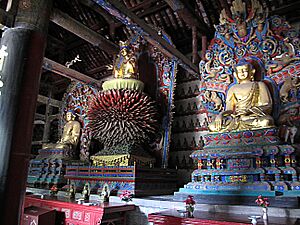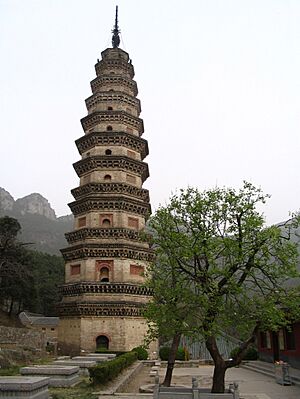Lingyan Temple (Jinan) facts for kids
Lingyan Temple is a famous Buddhist temple in Changqing District, Jinan, Shandong Province, China. It's about 20 kilometers (12 miles) north of Tai'an city. The temple is nestled in a valley on the edge of the Taishan mountains.
Lingyan Temple has a very long and interesting history. It was one of the most important temples in China during the Tang and Song Dynasties. Two of its most well-known parts are the 11th-century Pìzhī-tǎ (Pizhi Pagoda) and the Qiānfó-diàn (Thousand Buddha Hall). The Thousand Buddha Hall has a bronze Buddha statue from the Ming dynasty. It also has 40 painted clay statues of life-sized luohan (special Buddhist followers) from the Song dynasty.
Contents
A Look at Lingyan Temple's Past
How the Temple Began
Lingyan Temple first started around the years 357–358. It became more famous during the Northern Wei period (386–534). The temple reached its peak importance during the Tang dynasty (618–907) and Song dynasty (960–1279).
Life at the Temple
At its busiest time, Lingyan Temple had over 40 different wooden temple halls. It also had more than 500 rooms for monks. Over 500 Buddhist monks lived at Lingyan Temple when it was at its largest!
Ancient Structures Still Standing
The oldest buildings at the temple are stone stupas and square stone Chinese pagodas from the Tang dynasty. One of these is the Huichong Pagoda, built in the 8th century. There are 167 stone stupas at the temple, and each one is unique! Like the luohan statues in the Qiānfó-diàn, these stupas have been kept in great condition.
The tallest building at the temple is the Pìzhī-tǎ. It stands 54 meters (177 feet) tall. The first version of this pagoda was built in 753. However, the one you see today was built later, between 1056 and 1063. Even though the wooden halls were rebuilt during the Ming and Qing dynasties, the stone bases of the pillars in the Qiānfó-diàn are still the original ones from the Tang and Song eras.
Images for kids
-
Some of the 167 stupas in the stupa forest at Lingyan. Some are from the Tang dynasty (618 - 907), and some are as recent as the Qing dynasty (1644 - 1911).
-
This square stupa (742-755 AD, Tang dynasty) marks the burial place of monk Hui Chong. He led the monastery during his life.
-
A view of Lingyan Temple and Pìzhī-tǎ (Pizhi Pagoda) from a nearby cliff on Mount Tai.
See also
- Architecture of the Song dynasty
- List of sites in Jinan
- Cassock Spring
 | Selma Burke |
 | Pauline Powell Burns |
 | Frederick J. Brown |
 | Robert Blackburn |








